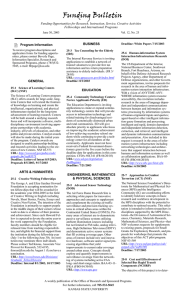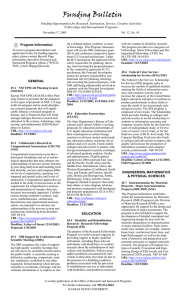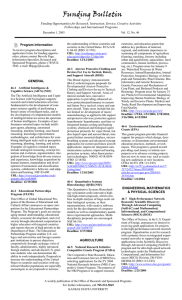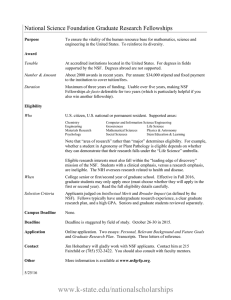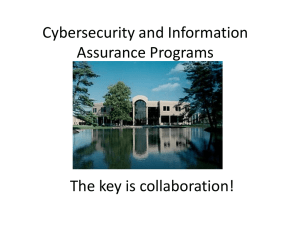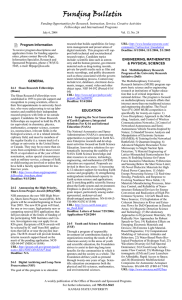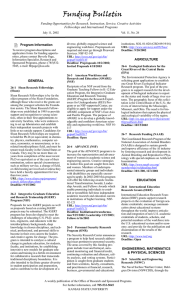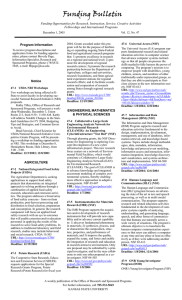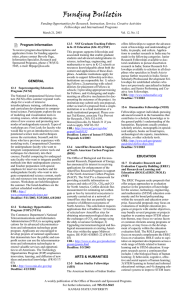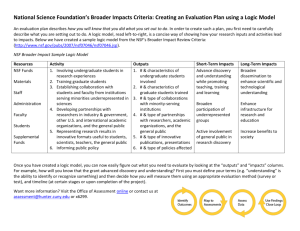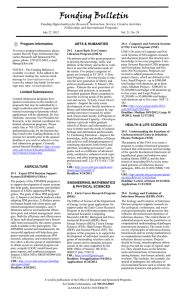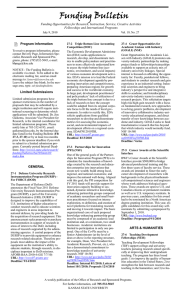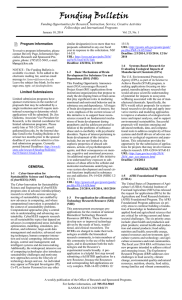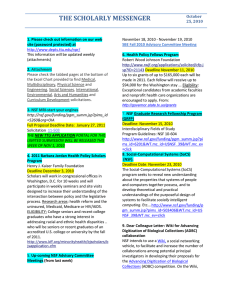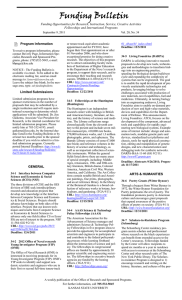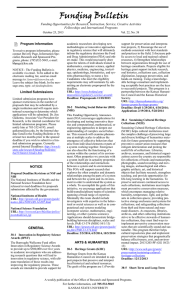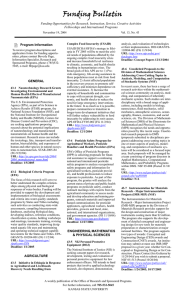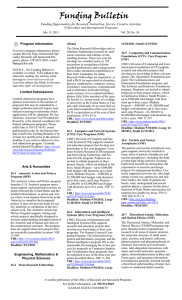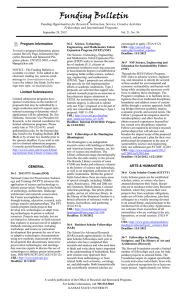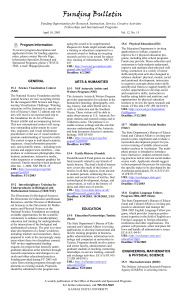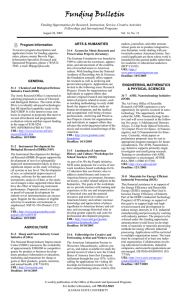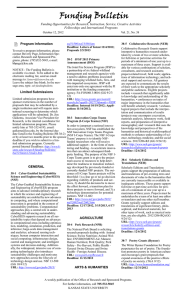Funding Opportunities for Research, Instruction, Service, Creative Activities
advertisement
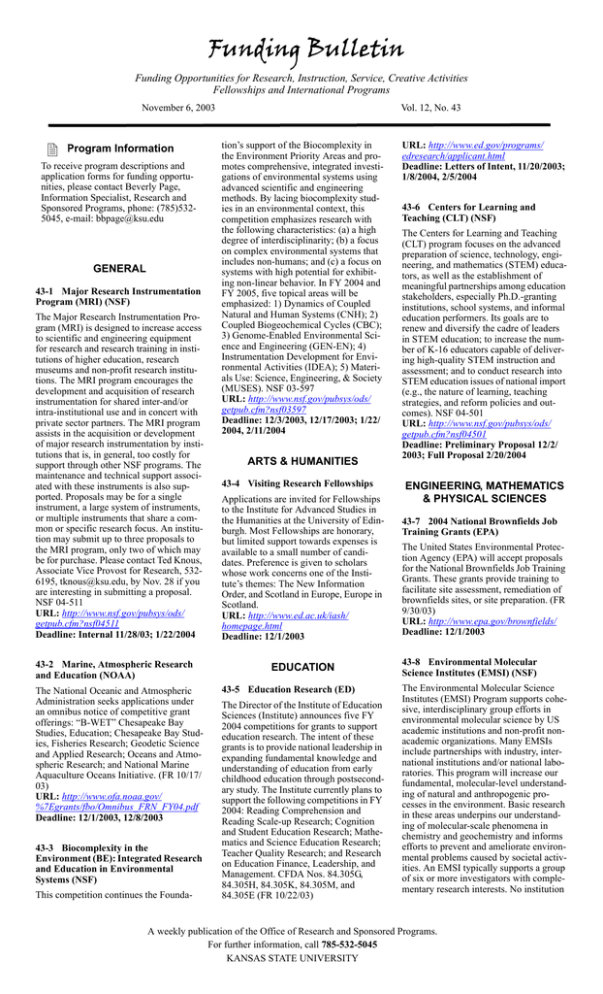
Funding Bulletin Funding Opportunities for Research, Instruction, Service, Creative Activities Fellowships and International Programs November 6, 2003 Program Information To receive program descriptions and application forms for funding opportunities, please contact Beverly Page, Information Specialist, Research and Sponsored Programs, phone: (785)5325045, e-mail: bbpage@ksu.edu GENERAL 43-1 Major Research Instrumentation Program (MRI) (NSF) The Major Research Instrumentation Program (MRI) is designed to increase access to scientific and engineering equipment for research and research training in institutions of higher education, research museums and non-profit research institutions. The MRI program encourages the development and acquisition of research instrumentation for shared inter-and/or intra-institutional use and in concert with private sector partners. The MRI program assists in the acquisition or development of major research instrumentation by institutions that is, in general, too costly for support through other NSF programs. The maintenance and technical support associated with these instruments is also supported. Proposals may be for a single instrument, a large system of instruments, or multiple instruments that share a common or specific research focus. An institution may submit up to three proposals to the MRI program, only two of which may be for purchase. Please contact Ted Knous, Associate Vice Provost for Research, 5326195, tknous@ksu.edu, by Nov. 28 if you are interesting in submitting a proposal. NSF 04-511 URL: http://www.nsf.gov/pubsys/ods/ getpub.cfm?nsf04511 Deadline: Internal 11/28/03; 1/22/2004 43-2 Marine, Atmospheric Research and Education (NOAA) The National Oceanic and Atmospheric Administration seeks applications under an omnibus notice of competitive grant offerings: “B-WET” Chesapeake Bay Studies, Education; Chesapeake Bay Studies, Fisheries Research; Geodetic Science and Applied Research; Oceans and Atmospheric Research; and National Marine Aquaculture Oceans Initiative. (FR 10/17/ 03) URL: http://www.ofa.noaa.gov/ %7Egrants/fbo/Omnibus_FRN_FY04.pdf Deadline: 12/1/2003, 12/8/2003 43-3 Biocomplexity in the Environment (BE): Integrated Research and Education in Environmental Systems (NSF) This competition continues the Founda- Vol. 12, No. 43 tion’s support of the Biocomplexity in the Environment Priority Areas and promotes comprehensive, integrated investigations of environmental systems using advanced scientific and engineering methods. By lacing biocomplexity studies in an environmental context, this competition emphasizes research with the following characteristics: (a) a high degree of interdisciplinarity; (b) a focus on complex environmental systems that includes non-humans; and (c) a focus on systems with high potential for exhibiting non-linear behavior. In FY 2004 and FY 2005, five topical areas will be emphasized: 1) Dynamics of Coupled Natural and Human Systems (CNH); 2) Coupled Biogeochemical Cycles (CBC); 3) Genome-Enabled Environmental Science and Engineering (GEN-EN); 4) Instrumentation Development for Environmental Activities (IDEA); 5) Materials Use: Science, Engineering, & Society (MUSES). NSF 03-597 URL: http://www.nsf.gov/pubsys/ods/ getpub.cfm?nsf03597 Deadline: 12/3/2003, 12/17/2003; 1/22/ 2004, 2/11/2004 ARTS & HUMANITIES 43-4 Visiting Research Fellowships Applications are invited for Fellowships to the Institute for Advanced Studies in the Humanities at the University of Edinburgh. Most Fellowships are honorary, but limited support towards expenses is available to a small number of candidates. Preference is given to scholars whose work concerns one of the Institute’s themes: The New Information Order, and Scotland in Europe, Europe in Scotland. URL: http://www.ed.ac.uk/iash/ homepage.html Deadline: 12/1/2003 EDUCATION 43-5 Education Research (ED) The Director of the Institute of Education Sciences (Institute) announces five FY 2004 competitions for grants to support education research. The intent of these grants is to provide national leadership in expanding fundamental knowledge and understanding of education from early childhood education through postsecondary study. The Institute currently plans to support the following competitions in FY 2004: Reading Comprehension and Reading Scale-up Research; Cognition and Student Education Research; Mathematics and Science Education Research; Teacher Quality Research; and Research on Education Finance, Leadership, and Management. CFDA Nos. 84.305G, 84.305H, 84.305K, 84.305M, and 84.305E (FR 10/22/03) URL: http://www.ed.gov/programs/ edresearch/applicant.html Deadline: Letters of Intent, 11/20/2003; 1/8/2004, 2/5/2004 43-6 Centers for Learning and Teaching (CLT) (NSF) The Centers for Learning and Teaching (CLT) program focuses on the advanced preparation of science, technology, engineering, and mathematics (STEM) educators, as well as the establishment of meaningful partnerships among education stakeholders, especially Ph.D.-granting institutions, school systems, and informal education performers. Its goals are to renew and diversify the cadre of leaders in STEM education; to increase the number of K-16 educators capable of delivering high-quality STEM instruction and assessment; and to conduct research into STEM education issues of national import (e.g., the nature of learning, teaching strategies, and reform policies and outcomes). NSF 04-501 URL: http://www.nsf.gov/pubsys/ods/ getpub.cfm?nsf04501 Deadline: Preliminary Proposal 12/2/ 2003; Full Proposal 2/20/2004 ENGINEERING, MATHEMATICS & PHYSICAL SCIENCES 43-7 2004 National Brownfields Job Training Grants (EPA) The United States Environmental Protection Agency (EPA) will accept proposals for the National Brownfields Job Training Grants. These grants provide training to facilitate site assessment, remediation of brownfields sites, or site preparation. (FR 9/30/03) URL: http://www.epa.gov/brownfields/ Deadline: 12/1/2003 43-8 Environmental Molecular Science Institutes (EMSI) (NSF) The Environmental Molecular Science Institutes (EMSI) Program supports cohesive, interdisciplinary group efforts in environmental molecular science by US academic institutions and non-profit nonacademic organizations. Many EMSIs include partnerships with industry, international institutions and/or national laboratories. This program will increase our fundamental, molecular-level understanding of natural and anthropogenic processes in the environment. Basic research in these areas underpins our understanding of molecular-scale phenomena in chemistry and geochemistry and informs efforts to prevent and ameliorate environmental problems caused by societal activities. An EMSI typically supports a group of six or more investigators with complementary research interests. No institution A weekly publication of the Office of Research and Sponsored Programs. For further information, call 785-532-5045 KANSAS STATE UNIVERSITY
